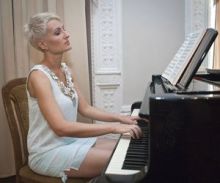It will be recalled that this pianist won a reputation of a talented musician back in her childhood. Namely our newspaper wrote about the young star who won applause in Poland when she was eight, and at age nine her talent charmed the jury of the 1st International Competition of Young Pianists in Memory of Vladimir Horowitz (the girl won bronze among the juniors). Incidentally after the brilliant debut the girl made in Chopin’s homeland, the Polish Institute in Kyiv and Embassy of the Republic of Poland awarded the pianist with a scholarship for performing the works of the Polish classic. Later the girl trained in various music and life universities, acquiring professional mastery both in Ukraine and abroad, hardened her character, competing and winning in prestigious international competitions. And now, feeling that she has something to say to the audience, the pianist is beginning an active touring activity.
You have recently come from a tour across Georgia, where you communicated with the audience and musicians. Please tell about the impressions you got during this journey.
“I have got many impressions. And the most important one is that Georgians very deeply understand the role of spiritual principles in the recreation of their state. This is manifested in their attitude to classical music. The repertoire in philharmonic societies shows a great number of foreign and Georgian performers, such as tenor Valeriano Gamghebeli, London Philharmonic Society Orchestra, pianists Eliso Virsaladze, Inga Fiolia, and many others. The concerts enjoy full houses. Besides, their state takes care of the talented youth. Reliable mechanisms of providing material assistance for them are working efficiently, and the government sponsors the talented creative people, so that they could take part in prestigious international competitions. Therefore our powers that be have much to learn from their Georgian colleagues in this aspect. Above all, they need to understand that the government starts with the concern about culture, preserving and fostering the spirituality of their people.”
Every artist has his own creative path. How did you start your ascension as a professional pianist?
“I took up music at the age of five. I graduated from the Kyiv-based Lysenko Special Secondary Music School and the National Academy of Ukraine, and trained for a year at the Hochschule fuer Musik und Theater Hamburg (Germany). The year 1995 came as a turning point for me, when at the age of almost 10 years I became the youngest winner of the 1st International Competition of Young Pianists in Memory of Vladimir Horowitz. I am really gratified that this competition has become prestigious and popular with young talented and promising performers from all over the world (this year the competition took place for the ninth time). I have taken part in the international competitions and festivals and I tour not only Ukraine, but also Poland, Germany, Russia, Italy, France, Israel, the Netherlands, Finland, Spain, and other countries.
“I was lucky to study in the class of a famous musician and pedagogue, NMAU professor Ihor Riabov, who developed in his students scale thinking when interpreting a music piece. The lessons in the class of renowned German pianist Volker Banfield, which revealed the boundless depth of German classical music, were very interesting.”
What are your favorite composers?
“I take interest in the music pieces of various times, genres, and streams: baroque, Viennese classic, romanticism, and impressionism. My favorites are Chopin, Liszt, Rachmaninoff, Shostakovich, Ravel, and Ma. My repertoire includes the works of Ukrainian composers, Mykola Lysenko, Ivan Karabyts, Mykola Vilensky, etc. I cannot live without music!”
You frequently go abroad. Could you draw a comparison between the Ukrainian realities and the life of foreigners?
“It is no secret that the financial state of our musicians of classical music is simply unbearable, not only compared with the well-developed country, but many countries of post-Soviet space as well. This leads to irremediable ‘washing out’ of the best performers of classical music, youth above all. Whole schools and streams are gradually vanishing. This situation needs to be changed. This should be a priority for the state policy in the sphere of culture and art. Lately everyone has admitted that Eastern Asia has turned into a powerful engine and locomotive of the world economy and that the role of this region on the international arena is gradually increasing. But in our country nobody pays attention to the fact that in Japan, China, and South Korea academic music has acquired unseen development, though it emerged on the European continent. Look at how confidently and with what ardor do the representatives of namely these countries win in the most prestigious international competitions. The farseeing leaders of these countries have understood the great life-giving power of classical music, and our powers that be have much to pick up from them.”







